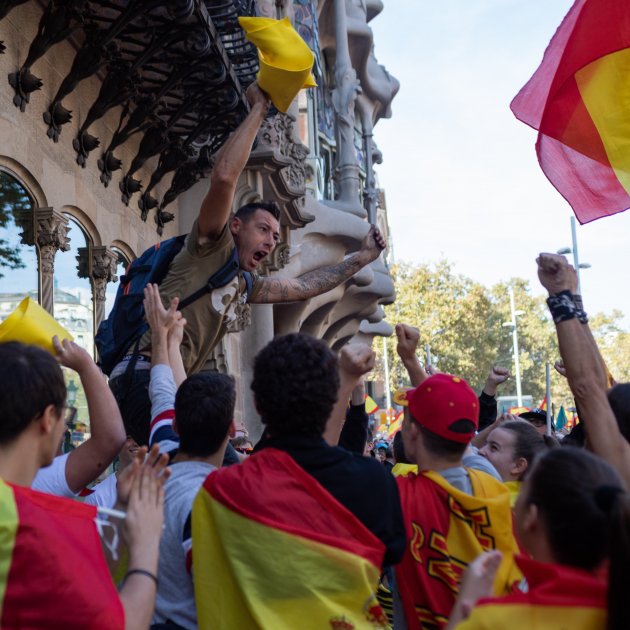Hundreds of thousands of people responded to the call from unionist group Catalan Civil Society and the Unionist political parties and inundated the centre of Barcelona this Sunday. The message to marchers appealed to Catalans to “return to common sense” and say “enough is enough” to the independence movement. At the moment of truth, the most frequently chanted slogan was the one popularized by extremist sectors a few days ago, referring to the Catalan president: “Put Puigdemont in prison”. As well, following the events of the last week, some added other names to their wish list: “And Trapero too” - meaning the head of the Mossos, the Catalan police.
In reponse to recent huge pro-independence mobilizations, unionism wanted to flex its muscles with a protest that started in the central square of Plaça Urquinaona and ended at Estació de França rail terminus, with a closing speech from Nobel Prize-winning Peruvian author Mario Vargas Llosa. As well there were addresses from an extensive representation of unionist politicians, who marched at the head of the protest.
N.T.
Speakers representing Spain's governing Partido Popular included the Minister of Health, Dolors Montserrat, the Barcelona delegate for the Spanish Government, Enric Millo, the president of the Autonomous Community of Madrid, Cristina Cifuentes, and the ex-president of the Balearic Islands, José Ramón Bauzá. For the Citizens party, its Spanish leader Albert Rivera spoke along with his Catalan counterpart Inés Arrimadas. The Catalan Socialist Party, which performed a balancing act in the way it called its followers to attend the march, was represented by the party secretary, Salvador Illa.
With cheers of “Catalonia is Spain”, “I too am Catalan” or “The silence is over”, the many thousands of people who gathered asserted that they represented a silent majority which the Catalan government ignores and marginalizes. In contrast to Vargas Llosa, who denounced that a coup d'état was underway, the discourse from Josep Borrell, ex-president of the European Parliament, offered words to calm the enthusiasm of the demonstrators: “The only people who go to prison are those who have been sent by a judge”. In opposition to the calls for a consumer boycott, he also suggested to carry on drinking Catalan cava.
Sergi Alcàzar
The Spanish police played a major role in the referendum a week ago, and this Sunday they were also protagonists. Even while on their way to Plaça Urquinaona for the protest, the many unionists who passed by the entrance to the Spanish Government's Barcelona delegation, took the opportunity to give congratulations and hugs to the duty agents of Spain's National Police force. At the police station in Via Laietana, Spanish police officers were given flowers. And when the National Police helicopter flew over the demonstration, it was greeted with effusive applause. "These are our police", sang the crowd.
On the other hand, the Catalan Mossos, who had the job of ensuring the security of the march, were received with shouts of “Traitors!” and “Trash!”. The name of Mossos leader Trapero was one of those that received most jeers.
“Later you will say, there were only a few of us”, was another frequent cry from the unionist demonstrators. The images show that this was the largest ever demonstration by unionism in Catalonia. There is however a battle of crowd-size figures: the march organization speaks of about a million people and the Barcelona city police bring this down to 350,000. Many of the organizers had called on sympathizers from other parts of the Spanish state to come to Barcelona. Parked in the streets nearby the protest were many coaches from the nearest Spanish regions of Valencia and Aragon, along with coaches from Madrid.
Another of the most repeated slogans was “Where is TV3?", referring to Catalan public television. The network, in fact, gave continuous live coverage of a unionist protest that far exceeded the crowd sizes at past gatherings on Spain's 12th October holiday.
As well as the Unionist parties that have parliamentary representation, other extremist and fascist political groups had also called people to the protest on Sunday, such as the Falange, Democracia Nacional and Somatemps. However, there was not a lot of pro-Franco symbology on display. The organizers themselves had expressly ordered to bring only Catalan, Spanish and European flags, to avoid the images which have been seen at other unionist rallies. The extremists themselves put out calls on social media for people to follow the instructions of the organization. But they weren't able to completely eradicate the unwanted symbols.
Sergi Alcàzar
